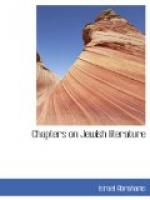The Kabbala did not, however, retain a high place in the realm of literature. It greatly influenced Jewish religious ceremonies, it produced saintly souls, and from such centres as Safed and Salonica sent forth men like Solomon Molcho and Sabbatai Zevi, who maintained that they were Messiahs, and could perform miracles on the strength of Kabbalistic powers. But from the literary stand-point the Kabbala was a barren inspiration. The later works of Kabbalists are a rehash of the older works. The Zohar was the bible of the Kabbalists, and the later works of the school were commentaries on this bible. The Zohar had absorbed all the earlier Kabbalistic literature, such as the “Book of Creation” (Sefer Yetsirah), the Book Raziel, the Alphabet of Rabbi Akiba, and it was the final literary expression of the Kabbala.
It is, therefore, unnecessary to do more than name one or two of the more noted Kabbalists of post-Zoharistic ages. Isaac Lurya (1534-1572) was a saint, so devoid of self-conceit that he published nothing, though he flourished at the very time when the printing-press was throwing copies of the Zohar broadcast. We owe our knowledge of Lurya’s Kabbalistic ideas to the prolific writings of his disciple Chayim Vital Calabrese, who died in Damascus in 1620. Other famous Kabbalists were Isaiah Hurwitz (about 1570-1630), author of a much admired ethical work, “The Two Tables of the Covenant” (Sheloh, as it is familiarly called from the initials of its Hebrew title); Nehemiah Chayun (about 1650-1730); and the Hebrew dramatist Moses Chayim Luzzatto (1707-1747).
A more recent Kabbalistic movement, led by the founder of the new saints, or Chassidim, Israel Baalshem (about 1700-1772), was even less literary than the one just described. But the Kabbalists, medieval and modern, were meritorious writers in one field of literature. The Kabbalists and the Chassidim were the authors of some of the most exquisite prayers and meditations which the soul of the Jew has poured forth since the Psalms were completed. This redeems the later Kabbalistic literature from the altogether unfavorable verdict which would otherwise have to be passed on it.
BIBLIOGRAPHY
KABBALA.
Graetz.—III, p. 547 [565]
MOSES DE LEON.
Graetz.—IV, 1.
ZOHAR.
A. Neubauer.—Bahir and Zohar, J.Q.R., IV, p. 357.
Steinschneider.—Jewish Literature, p. 104.
ISAAC LURYA.
Graetz.—IV, p. 618 [657].
SABBATAI ZEVI.
Graetz.—V, p. 118 [125].
CHASSIDIM.
Graetz.—V, 9.
Schechter.—Studies in Judaism, p. 1.
CHAPTER XVIII
ITALIAN JEWISH POETRY
Immanuel and Dante.—The
Machberoth.—Judah
Romano.—Kalonymos.—The
Eben Bochan.—Moses Rieti.—Messer
Leon.




